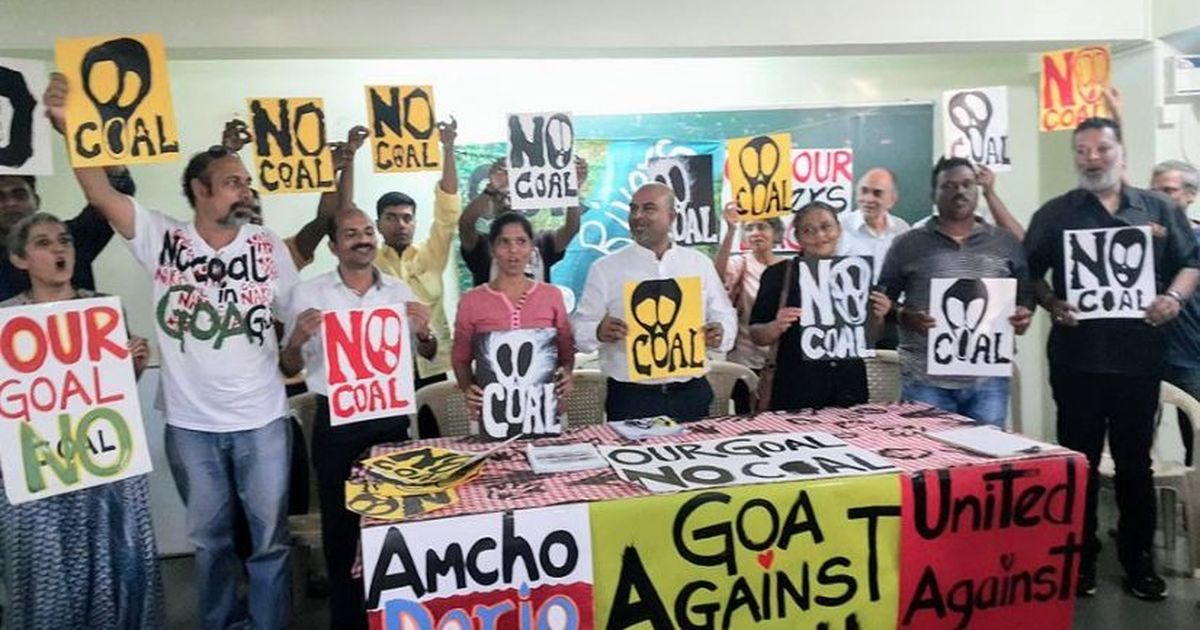 Australia is not the only place where Indian coal giant Adani is facing opposition to its coal and railway expansion projects.
Australia is not the only place where Indian coal giant Adani is facing opposition to its coal and railway expansion projects.VANGUARD - Expressing the viewpoint of the Communist Party of Australia (Marxist-Leninist)
For National Independence and Socialism • www.cpaml.org
 Australia is not the only place where Indian coal giant Adani is facing opposition to its coal and railway expansion projects.
Australia is not the only place where Indian coal giant Adani is facing opposition to its coal and railway expansion projects.
In the small former Portuguese colony of Goa, on India’s south western coastline, tens of thousands of Goans are fighting to stop an increase in coal imports, and their subsequent 350-kilometre transportation by train to steel plants in the neighbouring state of Karnakata.
Each day, an average of nine trains carrying 3800 tonnes of coal each, make the journey, the coal inadequately covered by blue tarpaulins. Coal dust settles on nearby villages and farm lands and contributes to acid rainfalls.
Currently, three importers – Jindal, Adani and Vedanta – bring in some 12 million tonnes of coal from South Africa and Australia. Now they want new infrastructure to enable them to handle up to 51 million tonnes by 2025.
Specifically, they want a new double-track rail line, new highways and the opening up of six rivers for coal-carrying barges.
Citizens and activists in Goa have for long protested against the increased coal movement and the pollution caused by coal dust. They have now banded together under two movements – Goa Against Coal, and Our River, Our Rights – to stop these projects. “We promise to continue and escalate our efforts until we defeat this attempt by a few corporations to destroy our rivers, lands and environment for transient profits,” the groups said.
In early November, South Western Railway started laying tracks at a village in Goa. The anti-coal movement called for a midnight blockade of the rail line, and up to ten thousand people responded, sitting on the tracks and causing the cancellation of train movements.
Christabelle Gomes, 22, stood with her friends. “I want to sit home and study. But so much disturbing information on social media that we are going to lose our biodiversity makes me angry. The government thinks we are foolish. I want to stand here. They need to take my consent, our consent.” When asked if she is scared of catching the Covid-19 virus, she replies, “I am not scared of the virus, I am scared of Coal. Why else will I be out at midnight by a railway track?”
Threats to biodiversity
Gomes’s concerns about biodiversity are widely shared.
Goa, which is well known for its idyllic sandy beaches on the shores of the Arabian sea, is bound to its east by the densely wooded and biodiverse ranges called the Western Ghats. For coal to reach the steel factories from the coal port, it would have to traverse the Ghats. This would entail takeover of 113.86 hectares of forest land and the felling of 18,451 trees. It would disrupt sensitive habitats, including the Bhagwan Mahavir Wildlife Sanctuary and the Dandeli-Anshi Tiger Reserve. The expansion of the highway connecting the port to the steel belt will cost another 12,000 trees. Also on the cards is an electrical transmission corridor along the same alignment.
Opposition growing
In Goa, the people’s movement is picking up pace.
Several of Goa’s parliamentary parties including the Goa Forward Party (GFP) and the Aam Aadmi Party (AAP), took part in the rail protest on November 3.
Another joined on November 18 when the opposition Nationalist Congress Party formally announced its opposition to the double tracking of the South Western Railway.
"We oppose the coal corridor 100 per cent. All people are against it. NCP is also against it," state president of the NCP Jose Phillip D'Souza told a press conference in Panaji.
Over the past few weeks, the panchayats or village councils in 54 of Goa’s 183 villages have passed resolutions opposing the movement of coal through their areas.
Abhijit Prabhudesai, founder of an environmental advocacy group called Rainbow Warriors, predicted that “If the government does not relent, the agitation is going to grow and take bolder steps.”